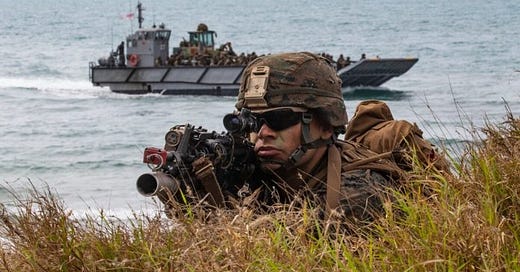Washington DC 16 Aug 2023
Marine Civil War Continues
One of the criticisms of FD2030 has been that COCOM commanders were not consulted. I found this hard to fathom, but could find no reference either way. This question, and much more, is addressed in the article below by Maj Gen Bill Mullen USMC (Rtd). The author threads a difficult needle of respecting all sides & then carefully pushing back on some misconceptions and rhetoric deployed by the critics of the initiative.
For the past 80 years, the US has become accustomed to supremacy in all domains. It has never had to fight to get to the fight. Security of LOCs & the homeland were assumed. Nothing stood in the way of delivering overwhelming firepower anywhere on the face of the earth. (Do not assume this form of warfare is the answer to war - that is a different discussion).
An intelligent adversary adapted to this circumstance & mirrored American capabilities (capacity is yet to be tested) within a narrow arc off its coast serviced by tight interior lines blanketed by a massed missile envelope.

To those alive to this new world of contested and denied zones, the challenge had become how to penetrate, operate, and gain traction, inside areas controlled by opposing forces. Put simply, landing a trad MEF on an island via big slow moving targets (I mean amphibs and 4kt combat vehicles) is a non-starter. For exp, every single target of military value on Guam is already dialed into PLA missiles.
The USMC has worked very hard to anticipate (and deliver) novelty in the unique conditions of the first-to-third island chains. FD2030 has not abandoned combined arms - the key criticism. It is working on a new mix of systems, with lighter, faster, smaller, logistical and emissions footprints, to deliver combined arms effects at critical points. More importantly, the new combined arms will have greatly extended range and be able to operate independently of jammed GPS and other space assets upon which we over rely. The Army is also hard at work on minimizing its amphibious footprint and delivering a logistical central nervous system throughout the region. The USAF's ACE concept will distribute assets where they cant be reached, and if they can, damage minimized.
All of these efforts and more, are no guarantee of success. There are no guarantees in warfare. Prima facie, they offer a better chance of success than legacy concepts. Pete Ellis and Commandant Lejeune did not know in 1921 that their concept would work in 1942. That did not stop them from imagining the next war and developing EABO and related ideas to rise to the challenge of the unknown.
Let the Marine Corps be the Marine Corps. If in the judgement of serving Marines that FD2030 has key elements that will contribute to their success then I trust that judgement. Their lives are on the line. Thats a pretty good motivator. The Corps is also trying to avoid preparing for the last war. Keep questioning and testing. But fight the war, not your fellow Marine.






